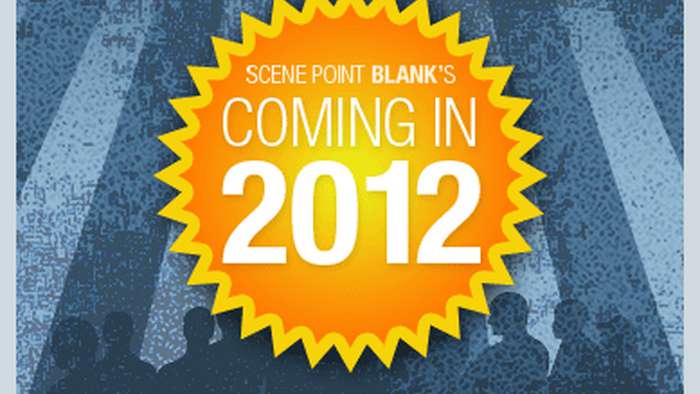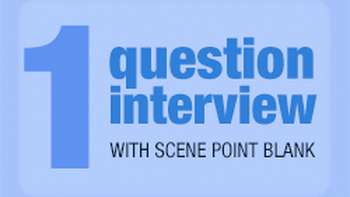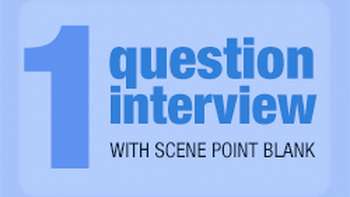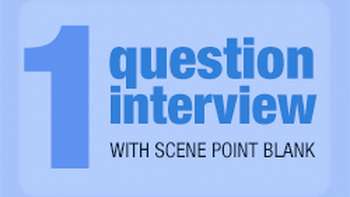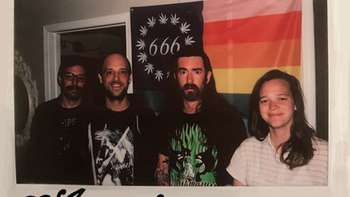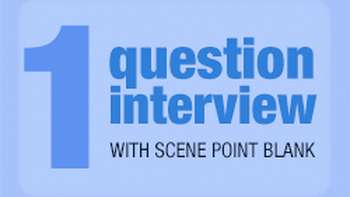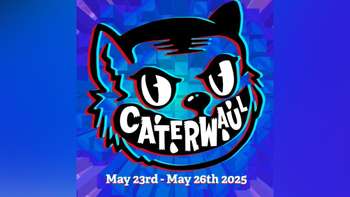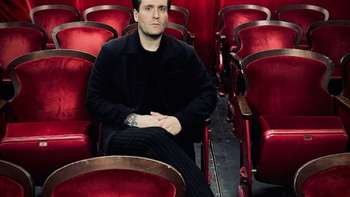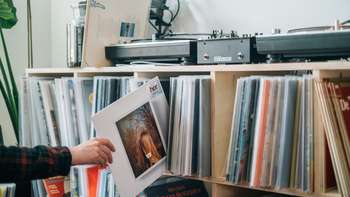
Honestly, I will never forget the first time that I listened to The Crystal World. I had just seen the cover artwork for the album (courtesy of Justin Bartlett) and ordered the double CD version from Utech that minute, but there could be no waiting for the physical copy to arrive and I downloaded the first CD shortly thereafter. What transpired next was something akin to a musical revelation as the droning and churning “Triumph Of Elimination” instantly hit its mark: darkness and light, hope and loss, pain and elation, all flowed forth simultaneously. I was hooked. Some time has passed since that first evening with Locrian and an intense tracking down of whatever I could get from the group has transpired. And then The Clearing came out, maybe a little out of nowhere (at least for me), and Locrian once again threw themselves back into the center of my aural hemisphere. I took a flyer and fired some questions to Andre, here is what transpired.
Scene Point Blank: How surprised or excited was the group with the reception The Crystal World? What, if any effect, did the response have on your later material (i.e., did it make you all more excited to write and record again or did you feel any pressure to follow up the release at all)?
Andre: I was really happy with the reception of The Crystal World. I think that album was a bit more accessible than some of our earlier stuff and that probably helped the album to reach new listeners. Personally, I was happy that we weren’t too rushed when we recorded the album. We worked in a really affordable studio which gave us some freedom to explore different layering ideas. We began recording our new album, The Clearing, right as we were finishing up The Crystal World. At that time, we were excited to be recording with Jeremy Lemos (the engineer for The Clearing) and we were excited about working on another release with Steven Hess. I don’t think that the success of The Crystal World has had much of an effect on our more recent recordings, though. The most recent Locrian—without collaborators—thing that we’ve recorded since The Crystal World was released was our “Dort Ist Der Weg 7” that came out over the summer. When we recorded that, I know that I, for my own personal satisfaction, wanted to do something that was a progression from anything else that we’ve done and I’m really happy with how that release came out.
Scene Point Blank: How much of a sign of things to come would you consider the Dort Ist Der Weg 7”?
Andre: I’m not really sure, to be perfectly honest. The music that we’ve recorded since the 7” (our Locrian/Mamiffer album and our Locrian & Christoph Heemann album) are different for me in that I don’t think of these as proper Locrian albums. I know that the three of us were a bit more critical of the music on the 7” and I think that the music on that turned out really nicely because we were really invested it in and we weren’t in much of a rush to finish it. If we’re able to do another Locrian full-length, then we haven’t discussed our ideas for it yet.
Scene Point Blank: Would you describe your attitude towards 7”s and EPs as being along the lines of them as a tool to explore other sounds that may or may not be included on a full-length? For instance might we one day hear Locrian’s take on HNW or some other obscure noise motif?
Andre: Terence and I both like some HarshNoiseWall stuff, but I don’t think that we’ll ever do anything that can be easily categorized. I think that there are actually parts of “Extinction” [CD2 of The Crystal World] that sounds like HNW stuff to me.
I think that 7”s can be great to explore different sounds that might now be included on a full-length, but the reason that I like them the most is that the sound constraints (you can only fit about 5-6 minutes per side). The sound constraints force you to say something really succinctly. I remember that as an undergraduate I used to take classes with an Onondaga chief named Oren Lyons who would routinely have to make statements to world leaders at the United Nations and other forums. He used to say that it was really easy to say something when you have no time constraints, but it was much more difficult when you have to say something really important in a shorter amount of time, which for him was often about 30 seconds. That’s the way that I feel about a 7”. I feel like on the last 7” that we did, we wanted to make a bigger statement, but we wanted to say it really quickly. In that sense, I think it was one of the most difficult things that we’ve recorded.
If there is another Locrian full-length, then I sometimes think that the best way for us to do it would be to try to make each of the tracks short enough to fit onto a side of a 7”.
Scene Point Blank: Speaking of the Dort Ist Der Weg 7”, it contains Locrian’s take on a song from Popol Vuh. Has the group ever thought about other covers or homages to your influences?
Andre: We all really like Popul Vuh and we thought that Dort Ist Der Weg was an interesting track for them because it was almost a rock song and sort of stands out from the rest of their catalog. We didn’t really overthink doing the track. I just remember thinking that it was going to be difficult to do the track justice, and that it would be a track that would possibly be a surprise to some people since it’s such an overlooked track for Popul Vuh.
Terence, Steven and I haven’t really discussed doing any other tributes to other musicians that we respect. I think that we’d rather focus on our own music, but I wouldn’t rule anything out. If we did something like that someday, then we’d want to do it well. It would be funny and challenging for us to do something that though.
I guess one of the things we’re working on right now is sort of a tribute to Coil. Coil recorded a bunch of writers reading their work with the intention of using these as sound sources for their music and they had some unfinished recordings when John and Sleazy died. There’s going to be a double LP of this material released and we’re working on using a recording that they did of Taylor Mead reading is work.
Scene Point Blank: You had two releases with Horseback in 2011, a split 7” and a collaborative EP entitled New Dominions. As I understand it, the 7” took a while to actually be released, but did that split lead to the collaboration on New Dominions? Did Locrian and Jenks Miller collaborate in person or did you trade ideas back and forth some way?
Andre: We began planning for the Locrian/Horseback 7” a while ago, maybe in mid-2009? I think that we recorded our music for that release in fall of 2009 or something and the label didn’t get around to releasing it until this year. When we recorded that 7”, we had no idea that we would be collaborating on an EP. We have been friends with Jenks since we started planning to do the split 7”. We were invited to play the Hopscotch Festival in 2010, which is in Jenks’ hometown so when we agreed to play that, Jenks asked us if we wanted to do some recording with him when we were in North Carolina. We spent about a day and a half recording that EP and then Jenks mixed the recordings on his own.
Scene Point Blank: Probably one of the most shocking aspects of Locrian is how often you release music. How does the group keep up with such a hectic writing and recording pace? How much of your recorded music is improvisation?
Andre: Our release schedule is deceiving because we actually don’t record very frequently. Oftentimes a recording offer is a motivation for us to get together and play. We’re all really busy, unfortunately, so we can’t play a lot of shows or do much touring. When we do get together we usually just get down to business and we’ll begin fleshing out ideas. The amount of our music that is improvised always changes. Typically, we have loosely structured songs with room for improvisation. Sometimes, our improvisations turn into tracks that we’ll loosely repeat in a live setting.
Scene Point Blank: One of the Locrian members recently moved if I am not mistaken. What kind of effect is the group expecting from the geographical distance?
Andre: Yes, Terence recently moved around Baltimore this summer. Locrian has constantly been changing since Terence and I started playing together in late 2005. I think that, if anything, the geographic distance will benefit us. For a while, I’ve felt a bit overwhelmed by the number of releases that we’ve had coming out and I think that Terence probably felt the same way. We’ve also played some shows that I feel like were more trouble than they were worth in the last few years. I like playing shows, but in the proper context. So I think that, if anything, if we keep playing then we’ll be able to make more focused and stronger statements and hopefully, if we play any shows, then they’ll be shows that make bigger statements as well.
Scene Point Blank: The Clearing seems to have a warm sound. Did the group alter the recording process or use different recording techniques for the album? How was the writing different or similar from previous efforts?
Andre: On The Clearing, we had a different set of tools to use than on previous efforts (e.g., a grand piano, different amplifiers, etc.) Jeremy Lemos was really conscious for us to use layers that didn’t step on other layers. He had a lot of great suggestions. We also wanted that album to be rawer than The Crystal World. We intended for it to be shorter—a single LP. Terence really wanted to use the grand piano, which turned into the first track on the album, “Chalk Point.” At the same time, I was really inspired by Randy Rhoades work on the first couple Ozzy Osborne records where he would double track his guitar solos to sound really thick. I did that on the first track and I think it gave it a really interesting tone. For other parts, I used the Arp Avatar guitar synthesizer which was the synthesizer that killed the Arp company in the late 1970s. I think that instrument really thickened up some of the album.
Side B, The Clearing track, came out of an idea we had to make a really think caveman-like jam. We did that track, and the others, without too much double-tracking. Most of what we recorded was live and Jeremy helped us to keep space for each part.
Scene Point Blank: I would not have thought of Randy Rhoades as a direct influence from listening to The Clearing, but you bring up an excellent point in regards to influences affecting more than just instrumental execution. Did you overdub the other guitar tracks or did you set up separate mics or cabinets?
Andre: Oh yeah, I love those first two Ozzy solo albums. I listened to them over and over when I was growing up and I always liked how Randy Rhoades would often double track his lead guitar parts and that’s really what inspired me to double track my guitar melody part of ‘Chalk Point.” I didn’t want to double it too closely though, since I wanted there to be some unpredictability to it. I think that when I overdubbed any guitar parts on “Chalk Point” I was trying to get different sounds so I would change up a guitar, and amplifier, or some effect.
Scene Point Blank: Did you vary the sound of the other guitar tracks from the original?
Andre: Yeah, on “Augury in an Evaporating Tower” I played my Arp Avatar guitar synthesizer. This put the guitar through two signals: the synthesizer signal and the signal from the Arp “Hex” pickup. We mostly boosted the synthesizer sound in the mix, but then I also did at least one overdub with a guitar going directly into the soundboard. The clean lead-ish guitar part on that track is direct into the board. I think it sounds really strange on the track since it was our most metal track on the album and the sounds that made the track metal are sounds that I wouldn’t expect hearing on a metal album.
Scene Point Blank: Are influences like this or certain recording techniques discussed amongst the band members prior to writing and recording?
Andre: It’s always different. I might have mentioned my Randy Rhoades idea to Terence and Steven, but I don’t think that it would have made much sense. We’ll talk about things like Brian Eno’s recording techniques and other recording techniques at times. I know that we all like to play with the recording process and the writing process.
Scene Point Blank: How much would you consider the band to be musical “gear heads”? Is there a large collection of vintage electronics and pedals spread across the membership of Locrian? Do you find trying out all sorts of equipment brings an excitement to your music on a personal level?
Andre: We like to do the best with what we have. We’re too broke to be gear heads. I have the same guitar, amplifier, and cabinet than I did when I was fifteen. I’d love to have new equipment, but the sounds that I get from that stuff are more about me than the equipment. The Arp Avatar was the first piece of different equipment that I’ve got in a really long time. I do use a vintage Echoplex and Terence uses some old synthesizers and tape machines. These things can sound great, but they also make our lives difficult when we play live. I do love playing with different equipment, though, especially older equipment which has a wider range of unpredictability to it than newer more digital equipment.
Scene Point Blank: The Clearing does have a live feel to its sound, particularly the drums in “Chalk Point” (they seem very warm) and just the way that the album spatially feels is almost organic. Is this going to be a further avenue of sonic exploration for Locrian?
Andre: Jeremy Lemos got a great sound for our instruments on The Clearing and I trust him more than any other engineer that we’ve worked with. I definitely think that he helped us to sound like a band and that’s something that we’ll probably keep in the future. Our Locrian/Mamiffer album is really warm as well and I think it really benefits what we do.
Scene Point Blank: Did you record live to tape or live to digital? What is your favorite recording medium: tape, digital, a combination?
Andre: We typically record to digital, though we’ll often process our instruments through tape when we’re recording. Terence and I recorded our Endless Plains/Flat Horizon tape directly onto tape and that’s the only thing that we’ve recorded onto 2” tape. Tape can add a nice tone to a recording, but it’s also time consuming, expensive, and limiting in some ways. Also, there are fewer and fewer people that have the knowledge to record a band onto tape. Digital recording has come a long way in the last few years so I don’t feel like we’re losing much from recording to digital. Our Dort Ist Der Weg 7” was recorded to digital, then directly to tape, and then digitized again and I think that added a nice warmth to the recording.
Scene Point Blank: Did the group have any goals in my mind when preparing for The Clearing? Did the record meet your expectations? What are you most satisfied with regarding the album and what might have been done differently with the record?
Andre: When we started recording that album, we had a lot of ideas and we had enough money for studio time to get about four ideas finished to our satisfaction. We really wanted the release after The Crystal World to be a single LP and to do something things that we haven’t done before.
For the most part, yeah, I’m really happy with our music on the release. We played bits of the album live before recording it and I wanted to include another track for the album, a track that Terence and I played live a few times. I think each of our four studio albums are really different musical statements and I sometimes wish that we would have not been so rushed by time deadlines but, at the same time, I’m really happy that each of these seem “real.” Real in the sense that we didn’t fix a lot of mistakes or unexpected noises that came up when we were playing. I’m kind of against fixing mistakes a lot of the time. I think that recordings that are too perfect lose something.
When we were recording The Clearing, Jeremy and I talked about the first concept album, Frank Sinatra’s In The Wee Small Hours and how at the time that album was recorded, everyone in the band had to be perfect when the recording was going since there wasn’t the isolation that some modern studios can provide artists. I feel like our recording was partially inspired by that idea. For most of it, the three of us were performing in the same room at the same time. For example, you can hear my guitar bleed into the piano microphone on “Chalk Point” before the drums come in.
Scene Point Blank: Does the live environment have a large influence on Locrian compositions? Does the group often work out arrangements live before recording?
Andre: I think that the live performance, or at least improvising live can add something to our compositions, but often our studio improvisations have led to the music on our studio albums. I would love to be able to work out stuff in a live setting before we record, but that isn’t always possible.
Scene Point Blank: How significant is the live element to Locrian as a whole?
Andre: I’m not sure. We generally like playing live, but it’s also been more and more difficult the more structured our sound has evolved. Now, it’s really difficult when we play live and something happens with our fragile old, sporadic equipment. I’m sure we’ll adapt though.
Scene Point Blank: In some ways, the type of bleed-through can be difficult to manage when mixing an album. How much time and effort did the three of you put into mixing The Clearing? What challenges arose during the process?
Andre: Bleed-through can be difficult, but at the same time it’s part of what we do. We want to play in the same room, we want there to be an element of unpredictability to what we do, we don’t want anything to sound too thought out.
We mixed the album really slowly. We probably finished the mix over about 3-4 shorter sessions. To be perfectly honest, Jeremy did a really nice job recording the album and it made mixing really simple. Each track also had a really unique sound which gave the recording a lot of space. Jeremy really appreciates space in his recordings and that helped the album out a lot.
Scene Point Blank: I have heard that The Clearing was sort of tailor-made for a vinyl LP release. Was this an actual design that the group had in mind from the beginning? Is format choice a conscious decision for certain releases? Your label, Land Of Decay, is mostly a cassette tape label; is this a conscious decision and what about tapes makes them an interesting format to release music?
Andre: Yeah, we wanted the album to be one LP. I think that it’s an effect of the compact disc for musicians to make really long albums and for people to expect really long albums. I think about some classic albums, e.g., Black Sabbath Paranoid, or any of the first Led Zeppelin albums, and most of them were on one LP even though they are these really big statements. We felt like we wanted to do the same thing with this album. I feel like if there was a CD version of The Clearing, that four tracks might even seem like too little for it, but the music feels appropriate for an LP.
Some people have said that The Clearing is more accessible than our other releases and I don’t necessarily agree. I feel like there are a lot of nuances to the album and I think that with an LP, a format that forces the listener to flip the music over at a certain point, the listener is forced to make more of an investment into really paying attention to the music. I also think that the artwork for the release, a photo from Brian Ulrich, is really important to our statement and I think that an LP helps to make that statement stronger.
Yes, we always think about format with our releases. I’m not sure that I would like The Clearing to be experienced as a CD or a tape because I really want people to have the best version of the album with the final artwork.
Our label, Land of Decay, focuses on tapes for a bunch of reasons. Obviously, we like the idea that tapes decay over time. I also like that it’s relatively cheap to release tapes, which means that we can work with musicians that we’re fans of. If we were to release records if one record didn’t sell well, then we’d be out of cash to release more releases. Tapes are cheap and fun so they aren’t as big of a chance. I also like the idea that we focus on small batches of tapes that we intend to only release in one edition. Our tapes are also not perfect even though we try to make them perfect. We might have the tapes professionally imprinted and the covers digitally printed, but usually the creases are a bit off, or there’s something about them that has a human touch. I think that human touch is important. The reason that we do limited quantities is because we both really like the physical object of a release and it also has a limited environmental impact. I think that these tapes are good and that they should remain in someone’s collection rather than the landfill someday.
I like the idea that with tapes, there’s no way for last.fm, Apple, Pitchfork, or whoever to track what you’re listening to at any time. I see tapes and records as a resistance to the digitization of music. The sound quality of the tape may be different from a high resolution digital file, but a musical statement made on a tape has a different meaning. I would say that it’s less removed from the musician and label that released the music and that’s one of the main reasons why we make music: that is to feel less removed from people, rather than more removed.
Scene Point Blank: I feel as though last.fm and the others are conscious choices that people make for tracking their listening habits. I agree with your assertion that digital music seems less personable than say a record or tape or maybe even a CD. Do you find that the digitization of music and the move to cloud storage marginalizes artists and music fans alike who actually like to create and manufacture and own and hold records or what have you in their hands?
Andre: Yes, those are all conscious choices. There are plenty of good things about last.fm, iTunes, etc. too. I think that digitization of music can be great, but it has a lot of unintended consequences. I think that things like last.fm can be great when it helps to build community. I’m not sure that I can talk about all artists but, for us, we think about the artwork, packaging, and everything about our release and when someone just hears a low quality digital version then I think that’s great in some ways, but it’s only part of the statement. On the other hand, it’s really crappy that it’s expensive to produce physical releases and it’s expensive to buy them (and to ship them) too.
Scene Point Blank: Sometimes it feels like file sharing and the proliferation of digital music like MP3s lessens the cultural impact of music and commoditizes music and musicians even more. Would you consider the format choice of your releases (be they Locrian or Land Of Decay) to be a cultural statement?
Andre: Our releases are cultural statements. The medium is part of the message.
Scene Point Blank: I never considered the format as an ecological statement, and the decay theme was lost on me until you mentioned it. Would you characterize these aspects of your involvement in music as a realization of impermanence of the recorded medium over time? Do you think that these views suggest an urgency in your work?
Andre: There are a lot of statements, and perhaps Terence and Steven would see this differently, but I think that limiting the number of physical copies is definitely part of an ecological statement. I mean, there is a contradiction there because tape production causes pollution, but I definitely feel better about making that pollution since the impact is more limited.
Recorded music is really impermanent and recent. Humans have only been recording music for a little over a hundred years and humans have been making music for thousands of years. So, yeah, I think of our work as being really impermanent. With every new technology: tapes, records, cds, etc., there’s a loss of something and I think that’s why tapes and records are becoming more popular. Many people are cognizant to that loss and that’s one of the many factors that’s causing a resurgence of popularity in these formats.
There is a strong ecological statement to Locrian’s work and I definitely think that the message is urgent. I hope it makes people feel something because we’re at a critical moment in the history of humanity and the history of the planet. There aren’t any nice, neat, clear solutions to our environmental condition right now. When I think about the critical environmental moment that we live in, then I feel the things that I hope the listener feels when they experience our work: sadness, horror, confusion, etc. I also feel some hope for the planet and humanity, but that feeling is more difficult for me. My hope is that our work makes the listener think about that although we’re not giving any clear “fix” to these problems.
Scene Point Blank: Artwork seems to be a significant aspect of Locrian, whether it is for the group’s own records or for the releases on Land of Decay. Do you consider the visual aesthetic important for Locrian’s music?
Andre: Oh yeah, the visual aspect is so important to the music. We make music because we have something to say and the visual aspect is one piece of that statement. Our statement isn’t direct either, which makes the visual aesthetic more important. Everything we do is part of the statement, from the edition size of our releases to the format to the lyrics to the feeling of the music. I think that our statement has been more effective on certain releases, but all of these aspects are important. Terence and I grew up in the hardcore scene, a scene that had a lot of nice little neat answers to bigger problems. We’re not giving the listener any neat little answer to bigger problems because our world is not that simple. We have responses to these bigger problems, but you need to interpret them.
Why does Locrian have so many limited edition releases? I would look for the answer in the sense that many of our releases have a theme of environmental disaster to them. What’s the context of our releases? Well, we live in a society that is addicted to growth—in terms of our population (7 billion and counting) and our economy. Our population and economy can’t keep growing if we want future generations to have future generations. So we keep releasing physical statements, but limited physical statement.
Scene Point Blank: How about music in general? How does the group decide on specific artists with regards to releases?
Andre: I think in general the visual is important for many important releases, but I don’t think that all releases are musically or artistically significant. With our releases for other artists on Land of Decay, we try to give the artist as much control as possible for the aesthetic of their group’s release. We respect the people that we release and if we work with them, then we think that their work is important and significant.
Scene Point Blank: How Closely does Locrian work with the artists who are visually contributing to your release? Do you explain specific themes of the recordings? Do you provide the artist the recordings ahead of time?
Andre: This depends on each release, but Terence has been responsible for the design and artwork on most of our releases. The cover of The Clearing was a photo that Brian Ulrich took and gave us permission to uses. On the other hand, the cover of The Crystal World was created especially for that release. We probably gave Justin Bartlett the music to the album before he finished the artwork. I honestly can’t remember.
Scene Point Blank: I would assume that some of the DIY aesthetic which you participate in with the label and the band derives from your previous involvement in the hardcore scene. Would you characterize the artists with which you work on Land Of Decay and the labels that you deal with in regards to Locrian as continuing some of the more positive community aspects of the hardcore scene?
Andre: I like to feel a sense of community with the artists that we work with. I guess I feel a difference sense of kinship with each of the different artists that we work with. We just released a Servile Sect tape and I feel a strange connection with that since I feel like they dovetail with some of Locrian’s music really nicely and I also met those guys recently, but they’ve shared a bunch of really old friends with me.
Scene Point Blank: How important is community to Locrian? You seem to carry the sense of community over into your music with the collaborations that you participate in, as well as the sheer breadth of labels that release Locrian’s music. How conscious is this, or is it born of necessity?
To me, community is really important although it’s confusing. I have all sorts of community: geographic, special interest, etc. One of the reasons we play music is to connect with people and that’s led us to doing so many releases with different labels. Each of the labels we’ve worked with has been a slightly different circumstance.
I feel like our music is more about us than any of our communities, though. We’ve collaborated with people in our community before but, for most of our existence as a band, it’s just been me and Terrence. I definitely think that the push from our community to perform and record has pushed us to do more and has helped.
Scene Point Blank: Locrian has a collaborative album coming soon with Mamiffer. What was the impetus behind this pairing? How was the recording process?
Andre: We’ve been communicating with Aaron Turner and Faith Coloccia for a while now and we were both scheduled to play the Utech Records festival in Milwaukee in June 2011. We discussed the idea of playing some shows together and/or doing some recording together before the fest. When it got closer to the festival, we were able to schedule some studio time and enough interest from labels to help to fund our recording.
The recording process was really great for the album. We were able to book a few days in Electrical Audio with Greg Norman as the studio engineer. It was really wonderful to be able to work in such a nice studio and to have so many unique instruments to play with, e.g., grand piano, tack piano, mellotron, lot of guitars, etc. Aaron and Faith have a lot of experience and great ideas so it was really a pleasant experience working with them. On that note, I’m really happy that the release is finally recorded, mixed, mastered and ready for release.
Scene Point Blank: Prior to hitting the studio, was there an exchange of musical ideas with Aaron and Faith? Or was the recording virtually spontaneous? How much music was conceptualized prior to recording?
Andre: Before we recorded, we didn’t have much of a chance to discuss ideas. We were primarily trying to figure out a way, financially, to make it work so that we could make a recording to be proud of. We were supposed to practice the day before we began recording, but Mamiffer got stuck in bad weather and couldn’t make it to Chicago. The day we began recording was the day that we began exchanging thoughts.
The ideas that I brought into the recording were all spontaneous, but I think that Faith and Aaron had a few existing ideas that they brought in.
---
Words: Bob
Photography: Rik Garrett
